The ECA Communications Strategy

As one of the five United Nations Regional Commissions, ECA has, over the years of its existence, dedicated itself to implementing a wide range of activities in support of African development. It has gone through a number of reforms in the past, ranging from divisional restructuring to reorientation of programmes aimed at strengthening its capacity and visibility as a key actor in the continent’s development.
The intention of the ECA Business Plan for 2013-2015, is “to become the think tank of reference on matters pertaining to African development.” To this end, the Executive Secretary, Mr. Carlos Lopes, in consultation with the staff at large, aims to transform ECA along these lines, to become a premier African policy think tank, and to be more influential with policymakers. This requires a strategic refocusing of the organization, repositioning and rebranding ECA as an innovative, professionally rigorous organization. One that is at the forefront of providing data and indepth research that can lead to better decisionmaking and policy direction for stimulating Africa’s economic future and transformation, and indeed, to assist member States in developing and implementing policies that are better at responding to citizens’ needs. To have wider impact, the strategic refocusing process also aims to strengthen the presence of ECA in countries and its relations with Governments, to the point that when it comes to consulting on policy research and advice on Africa, Governments would consider ECA as the institution of choice.
As part of this change process, a new ECA structure has been put in place to focus on the following thematic areas: macroeconomic policy; regional integration and trade; social development; natural resources; innovation and technology; gender; and climate change. Another important feature of the change agenda was the establishment of ten Task Forces to propose new ways of doing business in terms of the major institutional and administrative processes of the organization.
The work began in early 2013, and the results were considered and approved following a retreat of the ECA Senior Management in September. The results have now been formalized in the ECA Business Plan for 2013-2015.
Given the importance of communications in the effective functioning of any modern organization, one of the ten Task Forces was mandated to define a communications strategy to create and support the new positioning and branding of ECA. To this end, the present document represents the realization of the work of this Task Force, and the recommendations put forward have been incorporated therein.